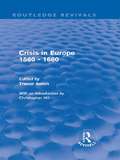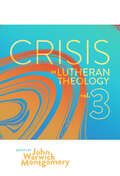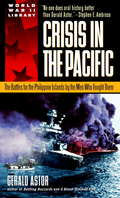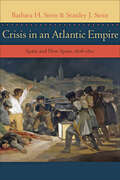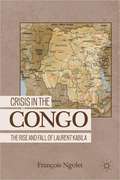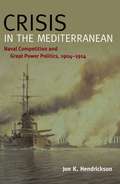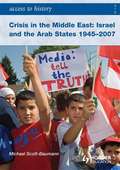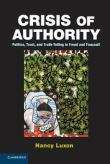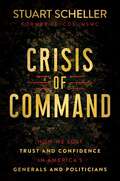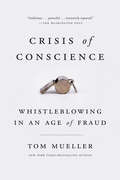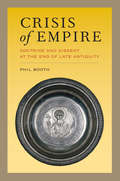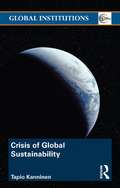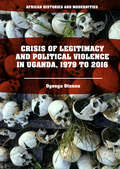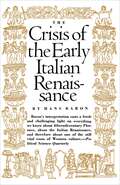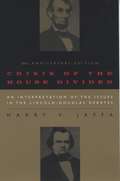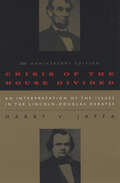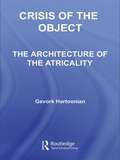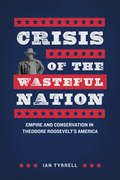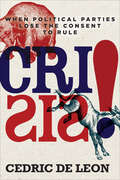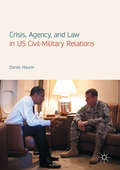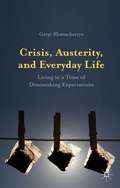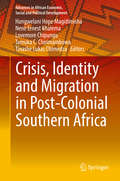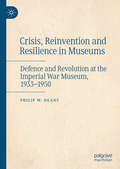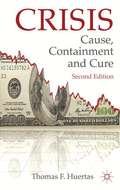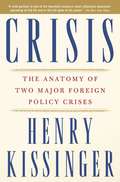- Table View
- List View
Crisis in Europe 1560 - 1660 (Routledge Revivals)
by Trevor AstonPast and Present began publication in 1952. It has established itself as one of the leading historical journals, publishing in lively and readable form a wide variety of scholarly and original articles. Much important work by English and foreign scholars on the sixteenth and seventeenth centuries first appeared in the form of articles in the journal. Originally published in 1965, this collection brings together a broad selection of these articles which have much common ground in the questions they discuss. Together they cover many aspects of crisis and change in most European countries – in society, government, economics, religion and education. The book will be welcomed by all interested in this much debated period.
Crisis in Lutheran Theology, Vol. 3: The Validity and Relevance of Historic Lutheranism vs. Its Contemporary Rivals (Crisis in Lutheran Theology)
by John Warwick MontgomeryAll Three volumes deal with the issue of biblical inerrancy (that the Bible is completely true and accurate, not only when it speaks to ideas of religious belief, but also when it speaks about factual elements of history and science, properly understood). This issue rocked the Lutheran Church Missouri Synod back in the late 1960s and early 1970s, prompting the release of the first two volumes. Volume one consists of essays by John Warwick Montgomery himself, and is addressed primarily to theologians. Volume two consists of an anthology by eight separate Lutheran contributors and is addressed to laymen as well as professional theologians. Volume 3 contains new, never before published material and consists of essays by Dr. Montgomery outlining a new challenge along the same lines. Dr. Jeffery Kloha suggested a few years ago with the latest critical edition of the New Testament (Nestle-Aland 28th Edition), because of the interchangeability of some variant readings, that we now had a "plastic text". Dr. Montgomery goes up against this assertion with everything he has. Though obviously addressing themselves primarily to Lutheranism, the materials are, to a large degree, equally applicable to many of the other Christian communions and will be found to be extremely valuable in assessing the needs of a variety of denominations.
Crisis in The Pacific: The Battles for the Philippine Islands By the Men Who Fought Them
by Gerald AstorFrom the depths of defeat. . . On December 8, 1941, one day after the bombing of Pearl Harbor, the Japanese Air Force struck the Philippines in the first blow of a devastating invasion. With an undersupplied patchwork army at his command, General Douglas MacArthur led a valiant defense of the Philippines. When defeat came, MacArthur swore he would return, while thousands of POWs fell into Japanese hands -- and faced a living hell that many would not survive. To the dawn of victory. . . In this gripping oral history, Gerald Astor brings to life the struggle to recapture the Philippines: the men who did the fighting, the battles that set the stage for an Allied invasion, and the acts of astounding courage and desperation that marked the campaign on both sides. From Corregidor to the Battle for Manila, from horrifying jungle warfare to cataclysmic clashes at sea, on beachheads and in the air,Crisis in the Pacificdraws on the words of the men who were there -- capturing this crucial heroic struggle for victory against Japan.
Crisis in an Atlantic Empire: Spain and New Spain, 1808-1810 (The Johns Hopkins University Studies in Historical and Political Science #131)
by Stanley J. Stein Barbara H. SteinThe capstone of a research endeavor begun by Barbara Stein and Stanley Stein nearly sixty years ago, this volume concludes their masterful tetralogy on Spanish economic and Atlantic history.With a compelling narrative that weaves together story and thesis and brings to life immense archival research and empirical data, Crisis in an Atlantic Empire is a finely grained historical tour of the period covering 1808 to 1810, which is often called "the age of revolutions."The study examines an accumulation of countervailing elements in a spasm of imperial crisis, as Spain and its major colony New Spain struggled to preserve traditional structures of exchange—Spain's transatlantic trade system—with Caribbean ports at Veracruz and Havana in wartime after 1804. Rooted in the struggle between businessmen seeking to expand their economic reach and the ruling class seeking to maintain its hegemonic control, the crisis sheds light on the contest between free trade and monopoly trade and the politics of preservation among an enduring and influential interest group: merchants.Reflecting the authors’ masterful use of archival sources and their magisterial knowledge of the era’s complex metropolitan and colonial institutions, this volume is the capstone of a research endeavor spanning nearly sixty years.
Crisis in the Congo
by François NgoletThis volume offers a comprehensive history and analysis of the Democratic Republic of the Congo during the tumultuous period of 1997 - 2001. The author examines the most recent events in this turbulent region, offering a contemporary account that is both extensive and detailed.
Crisis in the Mediterranean
by Jon K. HendersonThe geopolitical situation in the Mediterranean before the First World War has been generally ignored by historians. However, in the years before the War, the fact that the Mediterranean was shifting from British control to a wide open, anarchic state occupied the minds of many leaders in Austria-Hungary, Italy, France and Great Britain. This change was driven by three largely understudied events: the weakening of the British Mediterranean Fleet to provide more ships for the North Sea, Austria-Hungary's decision to build a navy capable of operating in the Mediterranean, and Italy's decision to seek naval security in the Triple Alliance after the Italo-Turkish War. These three factors radically altered the Mediterranean situation in the years leading up to the First World War, forcing Britain and France to seek accommodation with each other and France to begin rapidly building ships to defend both British and French interests. However, all of this activity has been largely obscured by the July Crisis of 1914 and the ensuing World War. Traditional history has looked backward from these events, and, in so doing, ignored the turbulent seas building in the Mediterranean. Conversely, this dissertation seeks to understand these events as they unfolded, to understand how policymakers understood the changing Mediterranean world. Ultimately, this dissertation seeks to redress the imbalance between historians, who have viewed the history of the Mediterranean in the early 20th century as a largely stable one, and policymakers in the Great Powers, who viewed the Mediterranean as a highly unstable region, and struggled to come to terms with that instability.
Crisis in the Middle East: Israel and the Arab States, 1945-2007 (Access to History)
by Michael Scott-BaumannThis book explores and analyzes the history of conflict in the Middle East from British rule in the early twentieth century to the Iraq war in the twenty-first century. The Arab-Israeli conflict is the main focus of this book but it also examines: Arab nationalism, especially in Egypt andSyria; the Islamic revolution in Iran in 1979; the causes and consequences of three wars involving Iraq; the growth of political Islam and Islamic fundamentalism in the Middle East. Throughout the book, key dates, terms and issues are highlighted, and historical interpretations of key debates are outlined. Summary diagrams are included to consolidate knowledge and understanding of the period, and exam-style questions and tips written by examiners provide the opportunity todevelop exam skills.
Crisis of Authority
by Nancy LuxonContemporary social and political theory has reached an impasse about a problem that had once seemed straightforward: how can individuals make ethical judgments about power and politics? Crisis of Authority analyzes the practices that bind authority, trust, and truthfulness in contemporary theory and politics. Drawing on newly available archival materials, Nancy Luxon locates two models for such practices in Sigmund Freud's writings on psychoanalytic technique and Michel Foucault's unpublished lectures on the ancient ethical practices of "fearless speech," or parrhesia. Luxon argues that the dynamics provoked by the figures of psychoanalyst and truth-teller are central to this process. Her account offers a more supple understanding of the modern ethical subject and new insights into political authority and authorship.
Crisis of Command: How We Lost Trust and Confidence in America's Generals and Politicians
by Stuart SchellerCombat-decorated Marine officer Stuart Scheller speaks out against the debacle of the Afghan pullout as the culmination of a decades-long and still-ongoing betrayal of military members by top leadership, from generals to the commander in chief, comes to light.Lieutenant Colonel Stuart Scheller was the perfect Marine. Battle tested. A leader. Decorated for valor. Yet when the United States acted like the Keystone Cops in a panicked haphazard exit from Afghanistan for political reasons, Scheller spoke out, and the generals lashed out. In fact, they jailed him to keep him quiet, claiming he lost the &“trust and confidence&” bestowed upon him by the Marines. When the faith and trust is exactly what our generals and even our commander-in-chief betrayed by exercising such reckless and derelict policies. Now Scheller is free from the shackles of the Marine Corps and can speak his mind. And in Crisis of Command, that he does. He holds our generals&’ feet to the fire. The same generals who play frivolously with the lives of our service men and women for political gain. The same general who lied to political leaders to further their own agendas and careers. Stuart Scheller is here to say that the buck stops here. Accountability starts now. It&’s time to demand accountability and stand up for our military. In this book, Stuart Scheller shows us how.
Crisis of Conscience: Whistleblowing in an Age of Fraud
by Tom Mueller"A call to arms and to action, for anyone with a conscience, anyone alarmed about the decline of our democracy." - New York Times-bestselling author Wendell Potter"Powerful...His extensively reported tales of individual whistleblowers and their often cruel fates are compelling...They reveal what it can mean to live in an age of fraud." -- The Washington Post"Tom Mueller's authoritative and timely book reveals what drives a few brave souls to expose and denounce specific cases of corruption. He describes the structural decay that plagues many of our most powerful institutions, putting democracy itself in danger." - George SorosA David-and-Goliath story for our times: the riveting account of the heroes who are fighting a rising tide of wrongdoing by the powerful, and showing us the path forward.We live in a period of sweeping corruption -- and a golden age of whistleblowing. Over the past few decades, principled insiders who expose wrongdoing have gained unprecedented legal and social stature, emerging as the government's best weapon against corporate misconduct--and the citizenry's best defense against government gone bad. Whistleblowers force us to confront fundamental questions about the balance between free speech and state secrecy, and between individual morality and corporate power.In Crisis of Conscience, Tom Mueller traces the rise of whistleblowing through a series of riveting cases drawn from the worlds of healthcare and other businesses, Wall Street, and Washington. Drawing on in-depth interviews with more than two hundred whistleblowers and the trailblazing lawyers who arm them for battle--plus politicians, intelligence analysts, government watchdogs, cognitive scientists, and other experts--Mueller anatomizes what inspires some to speak out while the rest of us become complicit in our silence. Whistleblowers, we come to see, are the freethinking, outspoken citizens for whom our republic was conceived. And they are the models we must emulate if our democracy is to survive.
Crisis of Empire
by Phil BoothThis book focuses on the attempts of three ascetics--John Moschus, Sophronius of Jerusalem, and Maximus Confessor--to determine the Church's power and place during a period of profound crisis, as the eastern Roman empire suffered serious reversals in the face of Persian and then Islamic expansion. By asserting visions which reconciled long-standing intellectual tensions between asceticism and Church, these authors established the framework for their subsequent emergence as Constantinople's most vociferous religious critics, their alliance with the Roman popes, and their radical rejection of imperial interference in matters of the faith. Situated within the broader religious currents of the fourth to seventh centuries, this book throws new light on the nature not only of the holy man in late antiquity, but also of the Byzantine Orthodoxy that would emerge in the Middle Ages, and which is still central to the churches of Greece and Eastern Europe.
Crisis of Global Sustainability (Global Institutions)
by Tapio KanninenThis concise and informative text provides a critical history of the concept of sustainability and the various institutional measures taken to promote, implement and enforce sustainable development, proposing new organizational solutions to deal with the crisis of sustainability. Crisis of Global Sustainability provides for the first time a compact insider description of the evolution and impact of the Club of Rome, a global think tank that produced a groundbreaking 1972 study "The Limits to Growth" which highlighted the dangers of unrestrained economic growth and possible collapse of global economy during the first decades of the 21st century. With recent research confirming the validity of these concerns, Kanninen asks whether our overarching concept of thinking on world development today should continue to be "global sustainability", which implies that we still have enough time to make adjustments in our future policies and action. Or should the main paradigm of our thinking shift to "global survivability", a concept that stresses the absolute necessity of immediate and drastic change both in institutions and policies? Many environmentalists, green politicians and think tanks are speaking today more loudly than ever about the necessity for a major policy, institutional and paradigm change and this work is essential reading for students and scholars alike.
Crisis of Legitimacy and Political Violence in Uganda, 1979 to 2016 (African Histories and Modernities)
by Ogenga OtunnuThis book, the second of two parts, demonstrates that societies experiencing prolonged and severe crises of legitimacy are prone to intense and persistent political violence. The most significant factor accounting for the persistence of intense political violence in Uganda is the severe crisis of legitimacy of the state, its institutions, political incumbents and their challengers. This crisis of legitimacy, which is shaped by both internal and external forces, past and present, accounts for the remarkable continuity in the history of political violence since the construction of the state.
Crisis of the Early Italian Renaissance: Revised Edition
by Hans BaronHans Baron was one of the many great German émigré scholars whose work Princeton brought into the Anglo-American world. His Crisis of the Early Italian Renaissance has provoked more discussion and inspired more research than any other twentieth-century study of the Italian Renaissance.Baron's book was the first historical synthesis of politics and humanism at that momentous critical juncture when Italy passed from medievalism to the thought of the Renaissance. Baron, unlike his peers, married culture and politics; he contended that to truly understand the Renaissance one must understand the rise of humanism within the political context of the day. This marked a significant departure for the field and one that changed the direction of Renaissance studies. Moreover, Baron's book was one of the first major attempts of any sort to ground intellectual history in a fully realized historical context and thus stands at the very origins of the interdisciplinary approach that is now the core of Renaissance studies.Baron's analysis of the forces that changed life and thought in fifteenth-century Italy was widely reviewed domestically and internationally, and scholars quickly noted that the book "will henceforth be the starting point for any general discussion of the early Renaissance." The Times Literary Supplement called it "a model of the kind of intensive study on which all understanding of cultural process must rest." First published in 1955 in two volumes, the work was reissued in a one-volume Princeton edition in 1966.
Crisis of the House Divided: An Interpretation of the Issues in the Lincoln-Douglas Debates
by Harry V. JaffaCrisis of the House Divided stands as the most thorough and penetrating work on the Lincoln-Douglas debates. Here, Harry Jaffa provides the definitive analysis of the political principles that guided Lincoln from his reentry into politics in 1854 through his Senate campaign against Douglas in 1858. To mark the fiftieth anniversary of the books original publication, Jaffa has provided a new introduction.
Crisis of the House Divided: An Interpretation of the Issues in the Lincoln-Douglas Debates, 50th Anniversary Edition
by Harry V. JaffaThis definitive analysis of the Lincoln-Douglas debates is &“one of the most influential works of American history and political philosophy ever published (National Review). In Crisis of the House Divided, noted conservative scholar and historian Harry V. Jaffa illuminates the political principles that guided Abraham Lincoln from his reentry into politics in 1854 through his Senate campaign against Stephen Douglas in 1858. Through critical analysis of the Lincoln-Douglas debates, Jaffa demonstrates that Lincoln&’s political career was grounded in his commitment to constitutionalism, the rule of law, and abolition. A landmark work of American history, it &“has shaped the thought of a generation of Abraham Lincoln and Civil War scholars." To mark the fiftieth anniversary of the original publication, Jaffa has provided a new introduction (Civil War History). "A searching and provocative analysis of the issues confronted and the ideas expounded in the great debates…A book which displays such learning and insight that it cannot fail to excite the admiration even of scholars who disagree with its major arguments and conclusions."—D. E. Fehrenbacher, American Historical Review
Crisis of the Object: The Architecture of Theatricality
by Gevork HartoonianLooking back over the twentieth century, Hartoonian discusses the work of three major architects: Peter Eisenman, Frank Gehry and Bernard Tschumi, in reference to their theoretical positions and historicizes present architecture in the context of the ongoing secularization of the myths surrounding the traditions of nineteenth century architecture in general, and, in particular, Gottfried Semper's discourse on the tectonic. Providing a valuable contribution to the current debates surrounding architectural history and theory, this passionately written book makes valuable reading for any architect.
Crisis of the Wasteful Nation
by Ian TyrrellLong before people were "going green" and toting reusable bags, the Progressive generation of the early 1900s was calling for the conservation of resources, sustainable foresting practices, and restrictions on hunting. Industrial commodities such as wood, water, soil, coal, and oil, as well as improvements in human health and the protection of "nature" in an aesthetic sense, were collectively seen for the first time as central to the country's economic well-being, moral integrity, and international power. One of the key drivers in the rise of the conservation movement was Theodore Roosevelt, who, even as he slaughtered animals as a hunter, fought to protect the country's natural resources. In Crisis of the Wasteful Nation, Ian Tyrrell gives us a cohesive picture of Roosevelt's engagement with the natural world along with a compelling portrait of how Americans used, wasted, and worried about natural resources in a time of burgeoning empire. Countering traditional narratives that cast conservation as a purely domestic issue, Tyrrell shows that the movement had global significance, playing a key role in domestic security and in defining American interests around the world. Tyrrell goes beyond Roosevelt to encompass other conservation advocates and policy makers, particularly those engaged with shaping the nation's economic and social policies--policies built on an understanding of the importance of crucial natural resources. Crisis of the Wasteful Nation is a sweeping transnational work that blends environmental, economic, and imperial history into a cohesive tale of America's fraught relationships with raw materials, other countries, and the animal kingdom.
Crisis!: When Political Parties Lose the Consent to Rule
by Cedric de LeonA timely analysis of the power and limits of political parties—and the lessons of the Civil War and the New Deal in the Age of Trump. American voters have long been familiar with the phenomenon of the presidential frontrunner. In 2008, it was Hillary Clinton. In 1844, it was Martin Van Buren. And in neither election did the prominent Democrat win the party's nomination. Insurgent candidates went on to win the nomination and the presidency, plunging the two-party system into disarray over the years that followed. In this book, Cedric de Leon analyzes two pivotal crises in the American two-party system: the first resulting in the demise of the Whig party and secession of eleven southern states in 1861, and the present crisis splintering the Democratic and Republican parties and leading to the election of Donald Trump. Recasting these stories through the actions of political parties, de Leon draws unsettling parallels in the political maneuvering that ultimately causes once-dominant political parties to lose the people's consent to rule. Crisis! takes us beyond the common explanations of social determinants to illuminate how political parties actively shape national stability and breakdown. The secession crisis and the election of Donald Trump suggest that politicians and voters abandon the political establishment not only because people are suffering, but also because the party system itself is unable to absorb an existential challenge to its power. Just as the U.S. Civil War meant the difference between the survival of a slaveholding republic and the birth of liberal democracy, what political elites and civil society organizations do today can mean the difference between fascism and democracy.
Crisis, Agency, and Law in US Civil-Military Relations
by Daniel MaurerThis book develops a responsible and practical method for evaluating the success, failure, or “crisis” of American civil-military relations among its political and uniformed elite. The author’s premise is that currently there is no objectively fair way for the public at large or the strategic-level elites to assess whether the critical and often obscured relationships between Generals, Admirals, and Statesmen function as they ought to under the US constitutional system. By treating these relationships—in form and practice—as part of a wider principal (civilian)-agency (military) dynamic, the book tracks the “duties”—care, competence, diligence, confidentiality, scope of responsibility—and perceived shortcomings in the interactions between US civilian political authorities and their military advisors in both peacetime and in war.
Crisis, Austerity, and Everyday Life: Living in a Time of Diminishing Expectations
by Gargi BhattacharyyaWill austerity never end? This timely and insightful book argues that austerity seeks to set the terms of political and economic life for the foreseeable future, extending techniques of exclusion to ever-greater sections of the population.
Crisis, Identity and Migration in Post-Colonial Southern Africa (Advances in African Economic, Social and Political Development)
by Nene Ernest Khalema Hangwelani Hope Magidimisha Lovemore Chipungu Tamuka C. Chirimambowa Tinashe Lukas ChimedzaThis book offers a socio-historical analysis of migration and the possibilities of regional integration in Southern Africa. It examines both the historical roots of and contemporary challenges regarding the social, economic, and geo-political causes of migration and its consequences (i. e. xenophobia) to illustrate how 'diaspora' migrations have shaped a sense of identity, citizenry, and belonging in the region. By discussing immigration policies and processes and highlighting how the struggle for belonging is mediated by new pressures concerning economic security, social inequality, and globalist challenges, the book develops policy responses to the challenge of social and economic exclusion, as well as xenophobic violence, in Southern Africa. This timely and highly informative book will appeal to all scholars, activists, and policy-makers looking to revisit migration policies and realign them with current globalization and regional integration trends.
Crisis, Reinvention and Resilience in Museums: Defence and Revolution at the Imperial War Museum, 1933-1950
by Philip W. DeansThis book explores museum crises. Through an investigation into the experience of the Imperial War Museum during the Second World War era, 1933-1950, it considers how crises disrupt museums and the contrasting defensive and revolutionary strategies which museums must adopt when mitigating crises. It is situated in a small but emergent literature concerning museums and crisis. Existing works mainly comprise contemporary studies on difficult museum experiences, predominantly financial difficulty, wherein the term crisis has been applied to describe an institution’s general state of malaise. This book, by contrast, presents an innovative and groundbreaking historical case study on a single museum facing wholesale physical and ideological collapse, deploying original crisis concepts to analyse different critical situations and the pathology underlying them.
Crisis: Cause, Containment and Cure
by Thomas F. HuertasThe current crisis is emerging as the most severe downturn since the Great Depression. This book examines its cause, the efforts to contain the crisis and proposes a cure that will limit the risk that such crises could recur in the future.
Crisis: The Anatomy of Two Major Foreign Policy Crises
by Henry KissingerBy drawing upon previously unpublished transcripts of his telephone conversations during the Yom Kippur War (1973) and the last days of the Vietnam War (1975), Henry Kissinger reveals what goes on behind the scenes at the highest levels in a diplomatic crisis.The two major foreign policy crises in this book, one successfully negotiated, one that ended tragically, were unique in that they moved so fast that much of the work on them had to be handled by telephone. The longer of the two sections deals in detail with the Yom Kippur War and is full of revelations, as well as great relevancy: In Kissinger's conversations with Golda Meir, Israeli Prime Minister; Simcha Dinitz, Israeli ambassador to the U.S.; Mohamed el-Zayyat, the Egyptian Foreign Minister; Anatoly Dobrynin, the Soviet Ambassador to the U.S.; Kurt Waldheim, the Secretary General of the U.N.; and a host of others, as well as with President Nixon, many of the main elements of the current problems in the Middle East can be seen. The section on the end of the Vietnam War is a tragic drama, as Kissinger tries to help his president and a divided nation through the final moments of a lost war. It is full of astonishing material, such as Kissinger's trying to secure the evacuation of a Marine company which, at the very last minute, is discovered to still be in Saigon as the city is about to fall, and his exchanges with Ambassador Martin in Saigon, who is reluctant to leave his embassy. This is a book that presents perhaps the best record of the inner workings of diplomacy at the superheated pace and tension of real crisis.
